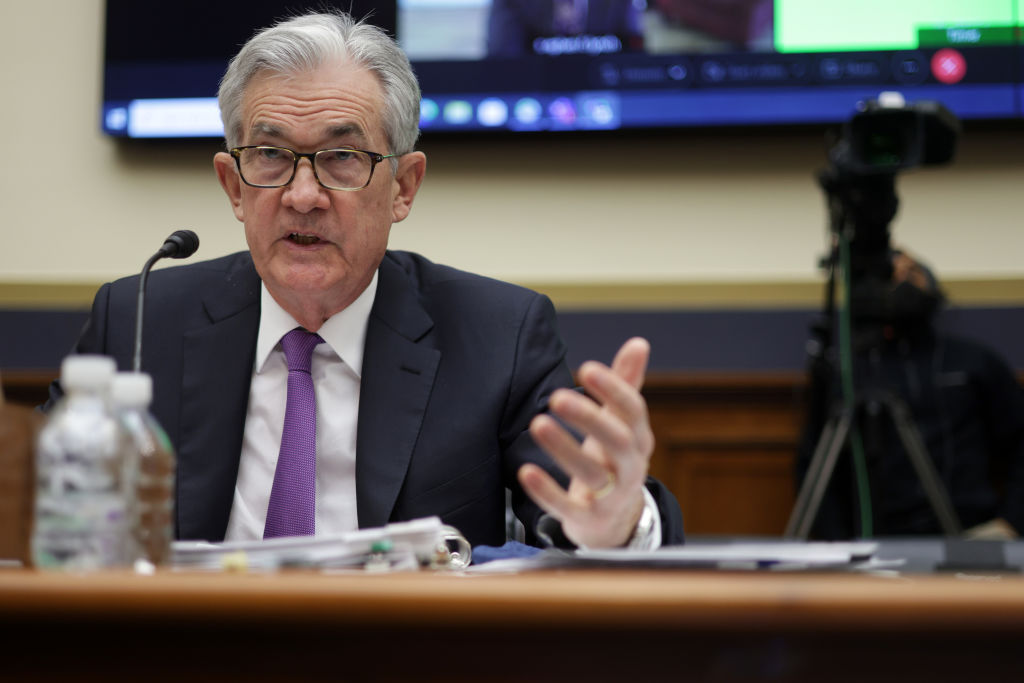The Fed predicted inflation-fighting 2022 rate hikes, and stocks surged. Should consumers cheer, too?


A free daily email with the biggest news stories of the day – and the best features from TheWeek.com
You are now subscribed
Your newsletter sign-up was successful
Federal Reserve Chairman Jerome Powell signaled Wednesday that the U.S. central bank is done treating inflation as a "transitory" phenomenon. Powell announced a faster-than-planned wind-down of the Fed's bond-buying program and said the Fed board may raise interest rates three times next year, upping the benchmark short-term rate from zero to a historically low 0.9 percent by the end of 2022.
Wall Street applauded Powell's announcement. "Stock prices rose gradually and then surged after the Fed issued its statement and Powell began speaking at a news conference," The Associated Press reports. "At the end of the day, stock market averages were all up more than 1 percent, a substantial gain."
Should U.S. consumers be equally pleased? The Federal Reserve hopes so.
The Week
Escape your echo chamber. Get the facts behind the news, plus analysis from multiple perspectives.

Sign up for The Week's Free Newsletters
From our morning news briefing to a weekly Good News Newsletter, get the best of The Week delivered directly to your inbox.
From our morning news briefing to a weekly Good News Newsletter, get the best of The Week delivered directly to your inbox.
One reason Powell dropped talk of "transitory" inflation is that the Fed now thinks the global supply chain snarls driving inflation will last longer than previously thought, and transitory doesn't relay that message, Politico's Victoria Guida explains. Prices will likely stabilize by next summer, and "part of this pivot is an effort to head off any change in expectations about inflation," she adds, "because inflation can also be sort of a self-fulfilling prophecy."
Gas prices are dropping from their recent peak, supply chain bottlenecks are easing, people are spending down their pandemic government stimulus checks, and Fed policymakers forecast Wednesday that inflation will slow to a 2.6 percent annual rate by the end of next year, AP reports. But if "consumers start to expect inflation to continue, Powell noted, it can make it harder for the Fed to control. If households expect higher prices, they tend to demand higher wage increases, which can then lead companies to raise prices further to offset their higher labor costs."
Currently, while inflation is way above target levels, wages are rising, hiring is solid, and unemployment has dropped to 4.2 percent and should hit 3.5 percent next year, Powell said. With the U.S. headed toward "maximum employment," the Fed will pivot to tamping down inflation, largely through tightening credit.
On a practical level, "the Fed's actions may raise borrowing costs across the economy in the coming months," AP reports. While borrowers might eventually take a small hit, higher interest rates help anyone with a savings account.
A free daily email with the biggest news stories of the day – and the best features from TheWeek.com
Peter has worked as a news and culture writer and editor at The Week since the site's launch in 2008. He covers politics, world affairs, religion and cultural currents. His journalism career began as a copy editor at a financial newswire and has included editorial positions at The New York Times Magazine, Facts on File, and Oregon State University.
